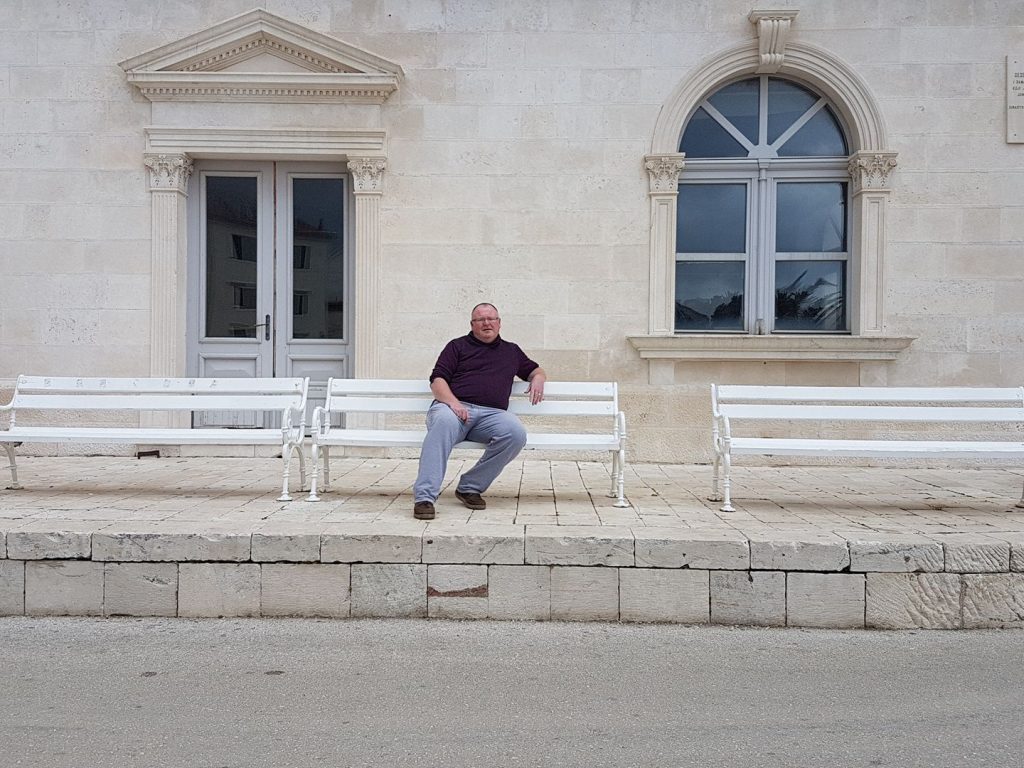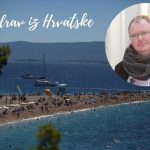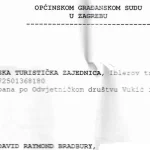(Please note that I have decided not to republish the meme in question, as the case is ongoing, but you can view it here, as it has also been published by Croatian media)
Business number: 42 Pn-2037/20-5
Legal matter: Plaintiff: Croatian National Tourist Board
Defendant: Paul David Raymond Bradbury
Matter: damages
An invitation to the defendant to file a response to the lawsuit
The lawsuit dated 12 August 2020 is submitted to the defendant, and he is invited to respond to the lawsuit (Article 284, paragraph 1 of the Civil Procedure Act – OG 53/91, 91/92, 112/99, 88/01, 117/03, 88/05, 2/07, 84/08, 96/08, 123/08, 57/11, 148/11, 25/13, 89/14 and 70/19 – further: ZPP).
The deadline for filing a response to the lawsuit is set at 30 days from the date of delivery of the lawsuit (Article 285, paragraph 2 of the LCP).
In response to the lawsuit, the defendant is obliged to state all of the relevant facts and propose all of the evidence to refute the allegations and evidence of the opponent, the defendant can comment on the claims and allegations of the lawsuit, is obliged to attach the documents referred to, if possible, and after the conclusion of the previous procedure, the defendant may not present new facts and propose new evidence, except in the case referred to in Art. 299 para. 2 of the LCP (Art. 284 para. 3 and Art. 285 para. 1 of the LCP).
If the defendant does not file a response to the lawsuit within the specified period, a judgment will be rendered accepting the claim if the conditions from Art. 331.b. paragraph 1 of the CAP.
The response to the lawsuit must be submitted by reference to the above business number of the file in two copies.
In Zagreb on November 19, 2020
Judge: Davorka Ćurko Nasić, acting
For the accuracy, the dispatch-authorised officer:
Ina Ježić
Record number: 1789a-e92cc Control number: 07caf-a816f-8cbf7
This document is digitally signed electronically with the following certificate: CN = e-Justice, L = ZAGREB, OID.2.5.4.97 = HR72910430276, O = MINISTRY OF JUSTICE AND ADMINISTRATION, C = HR
You can check the authenticity of the document at the following web address: https://usluge.pravosudje.hr/provjera-vjerodostojnosti-dokumenta by entering the above record number and document control number. You can also check by scanning the QR code. In both cases, the system will display the original of this document. If this document is identical to the original shown in digital form, the Municipal Civil Court in Zagreb will confirm the authenticity of the document.
1. The plaintiff is the umbrella national tourist organisation in the Republic of Croatia, the organisation, tasks, manner and the objectives of which are regulated by the Law on Tourist Boards and the Promotion of Croatian Tourism.
Therefore, in their work and activities, the plaintiff acts only and exclusively in accordance with their role as is defined by the Law on Tourist Boards and the Promotion of Croatian Tourism.
EVIDENCE: – The hearing of the parties;
2. The plaintiff, as the umbrella tourist organisation, presents the Republic of Croatia as a tourist destination on international tourist markets through the official logo and slogan “Croatia Full of Life”.
On 05.08.2020. On his Facebook profile, the defendant published a maliciously altered official logo of Croatia as a tourist destination on his Facebook profile (cover image/photo) in such a way that the plaintiff’s official slogan known and recognisable worldwide as “Croatia Full of Life” was maliciously and mockingly altered to “Croatia Full of uhljebs”
EVIDENCE: – The defendant’s post on his Facebook profile, attached in a copy;
3. By the described conduct, the defendant, in a public space, presents the plaintiff in a mocking and malicious manner as an organisation made up of unprofessional persons politically installed in positions within the organisation itself, which is absolutely incorrect and untrue.
Namely, as mentioned above, the entire organisation and manner of the work [carried out by] the plaintiff is based on strict compliance with all Croatian laws and regulations, especially the Law on Tourist Boards and the promotion of Croatian tourism.
Following the above, it is obvious that by publishing the previously cited untrue and insulting allegation, the defendant grossly and severely violated the plaintiff’s character within what is set out in Article 19 of the Civil Obligations Act, which is reflected in the violation of reputation and reputation.
Precisely for this reason, and due to the violation of the plaintiff’s reputation, the plaintiff in this civil proceeding demands from the defendant adequate monetary satisfaction in the amount of 50,000.00 kuna.
EVIDENCE: – The hearing of the [involved/present] parties;
– As before, – if necessary, other evidence [can be presented];
4. Following all the above, the plaintiff proposes that the competent court, following the evidentiary procedure, render the following:
I. The defendant is ordered to pay the plaintiff the amount of 50,000.00 kuna together with the corresponding statutory default interest rate from 07.08.2020 as the date of the filing pf the lawsuit until payment at the rate of the average interest rate on loans granted for a period longer than one year to non-financial companies calculated for the reference period preceding the current half [of the year], increased by three percentage points, within 15 days under the threat of enforcement/foreclosure (ovrha)
II. The defendant is ordered to reimburse the plaintiff for the incurred litigation costs together with the corresponding statutory default interest from the date of the first instance judgment until payment at the rate of the average interest rate on loans granted for more than one year to nonfinancial companies calculated for the previous reference period increased by three percentage points, within 15 days under the threat of enforcement/foreclosure (ovrha).
Bradbury Lawyer Vanja Juric Reply
I. The defendant authorised attorney Vanja Jurić from Zagreb, Ulica grada Mainza 13 to represent him in this case, so it is proposed to deliver all letters [relating to this case] to the address of the law office.
II. The defendant fully disputes the merits of the lawsuit and the amount of the lawsuit, for the following reasons:
1. The plaintiff is not actively legitimised.
1.1. The plaintiff filed the lawsuit for the purpose of satirical publication/caricature of the tourist slogan of the Republic of Croatia, and on the defendant’s private Facebook profile. The disputed publication contains the words “Croatia full of uhljebs”.
1.2. The content that is the subject of this proceeding does not mention the plaintiff, their employees, or management, nor does it mention the actions of the defendant, nor does it refer to the plaintiff in any single part of it. Indeed, the controversial publication doesn’t even relate to the plaintiff nor was it conceived or published for that purpose.
1.3. Consequently, the rights of the plaintiff’s person (as an entity), could not have been violated on this basis, so the plaintiff is not actively entitled to conduct this procedure nor does the plaintiff have any legal interest in initiating it. In accordance with the allegations, the defendant proposes, without further discussion, to have the claim rejected in its entirety.
EVIDENCE: – An insight into the disputed publication of the defendant.
2. The plaintiff did not request an apology or the removal of the publication
2.1. The Civil Obligations Act (Croatian: ZOO), in Art. 1099 and 1100 determine the ways of repairing non-pecuniary damage. The ZOO determines that “non-pecuniary damage is primarily repaired” by publishing a correction, withdrawing the statement by which the violation was committed or whatever else that can achieve the purpose achieved by fair monetary compensation. ” The payment of fair monetary compensation is prescribed by law only as a secondary way of repairing non-pecuniary damage, and only when “the severity of the injury and the circumstances of the case justify it.”
2.2. As can be seen from the lawsuit itself, the disputed content was published on August the 5th, 2020, and the plaintiff had already filed a lawsuit in this case on August the 12th, ie only 7 days later. The plaintiff, if the damage had actually occurred to them, would have asked the defendant to remove the disputed publication or seek an apology. However, the plaintiff does not seek such means (the removal of the publication, the publication of a final judgment, an apology etc.) even in this procedure, which shows that the plaintiff did not make even the slightest effort to correct the allegedly harmful information or for the defendant to ”compensate them” for any of the alleged damage in ways that, as primary means, the law allows for. The plaintiff, by not filing a request for an apology or a withdrawal of the statement, showed that no harm was actually done to them.
3. Context – the Croatia full of life slogan
3.1. The slogan Croatia full of life is not a sign/stamp that marks the Croatian National Tourist Board, but the slogan of the Republic of Croatia as a tourist destination. This fact is not disputed by the plaintiff themselves, when they state in the lawsuit that the aforementioned slogan “presents the Republic of Croatia as a tourist destination on global tourist markets.”
EVIDENCE: – This is indisputable/is generally known
– An insight into the content of the lawsuit
3.2. During the disputed period, the tourist season in Croatia was going on, during the coronavirus pandemic, which led to a continuous public debate on the state of Croatian tourism, the efforts and effects of the state to effectively present Croatia as a safe tourist destination for foreign guests and to improve tourism results in such difficult circumstances.
3.3. The publication of the defendant was part of such a public debate, and referred in general to the Republic of Croatia, the state administration system and a slow and non-innovative system that fails to recognise the seriousness of the situation and reacts extremely sluggishly to new circumstances. The term “uhljeb” does not refer to the plaintiff, but to the entire state apparatus which, due to the way it functions, is not able to react to these altered market circumstances.
EVIDENCE: – The hearing of the defendant
4. Public interest
4.1. Tourism is one of the economic branches from which a significant number of Croatian citizens live. In addition, Croatia’s revenues from tourism reach as much as 25% of GDP, so there can be no doubt that the success of tourism and tourism as such is a matter of significant public interest.
4.2. On the other hand, even if the disputed publication had referred to the plaintiff – the plaintiff is a public authority, whose activities are financed with taxpayers’ money and which is responsible for the affairs and functioning of the tourism industry in Croatia. Therefore, any member of the public or the media has the right and duty to comment, criticise and problematise their public actions and all circumstances related to the performance of tasks delegated to them. In that sense, every member of the public or the media would have the right to state a value judgment about the plaintiff as an “uhljeb”.
5. Assumptions of liability for damages
5.1. In proceedings of this kind, the plaintiff is required to prove the cumulative existence of all presumptions of liability for damages. The plaintiff has not, nor will they be able to prove these assumptions, since:
– The disputed publication does not mention or refer to the plaintiff at all;
– The information in question is not objectively capable of harming the plaintiff;
– The publication of the defendant does not constitute a harmful act, since it represents a satirical value judgment on the Republic of Croatia and on a topic of public interest;
– The defendant’s conduct is not unlawful.
5.2. Given that the facts in this case are quite clear, the defendant at this stage will not go into more detail to clarify each of these items and refer to specific decisions of Croatian courts and the European Court of Human Rights, relating to the freedom of expression and the responsibility for [the expression] of opinion. However, the defendant draws the court’s attention to the plaintiff’s allegations that the defendant acted unlawfully, given that such a possible finding of the court would be contrary to all existing standards of freedom of expression, especially when such expression refers to the work of the state or public authorities. Making established judgments about the work of public authorities is not and cannot be illegal.
6. An attempt to retaliate against the defendant
6.1. The defendant considers that this lawsuit was not filed for damages to be claimed by the plaintiff, but as an attempt to retaliate against the defendant. Namely, this is the second procedure initiated by the plaintiff against the defendant personally, although there is no valid legal basis for this and it is certain that the plaintiff cannot succeed in these proceedings. The defendant considers that the plaintiff, with taxpayers’ money, ie money from the state budget of the Republic of Croatia, is financing the conduct of such proceedings which represent unfounded and revenge litigation, with the purpose of causing censorship from the defendant and endangering his [financial] existence. The defendant considers it inappropriate, even deeply compromising, for the plaintiff to spend taxpayers’ money on “punishing” private individuals because of their expression of an opinion.
6.2. The defendant finds it indicative that the plaintiff:
– Did not submit to the defendant a request for apology or the removal of the disputed publication, to which they were legally entitled;
– Nor does the claim in this case seek the publication of a final judgment or the removal of the disputed publication (which allegedly caused so much damage to the plaintiff);
– Did not file a lawsuit against other persons and/or the media who satirically questioned the actions of the state during the tourist season;
– In the present proceedings the plaintiff seeks only a disproportionately high sum of money, in respect of the alleged damage, although it is quite clear that such damage cannot be awarded to the plaintiff, either by law or in accordance with case law;
6.3. The plaintiff, although they had a number of legal remedies at their disposal, did not take a single measure to have the alleged damage repaired/corrected, but instead filed a lawsuit directly and personally against the defendant, for damages in the amount of as much as 50,000.00 kuna. For this reason, the defendant considers that this procedure was not initiated to protect the defendant’s reputation – since the information itself is not objectively suitable to harm the plaintiff – but to force the defendant to stop speaking publicly about the problems of tourism by bringing his very existence and financial stability into question. Given the provisions of the Civil Obligations Act, the defendant considers that the claim for fair monetary compensation in this case is incompatible with the legal purpose of awarding such compensation and that the claim, on this basis, should be rejected.
* * * * *
Following the above, it is proposed to the court to reject the plaintiff’s claim in its entirety, and to oblige the plaintiff to reimburse the defendant for the litigation costs caused.
You can read the full text of the first lawsuit and reply here.












